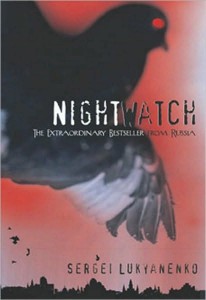Review of Night Watch by Sergei Lukyanenko
By ALEXIS NEAL
Years before emotionally stunted vampires first sparkled in idyllic mountain meadows, bloodthirsty creatures of the night stalked the streets of Moscow in search of human prey—and they are not the only ones. To the vampires, shape shifters, and dark sorcerers of the world, humans are a commodity, a resource to be exploited by any means necessary to any end deemed desirable. The only thing restraining these “Dark Ones” is a treaty with the other side—the agents of Light. From sunset to sunrise, the Night Watch (“Light Ones”) patrols the city, monitoring the Dark Ones’ compliance with the treaty and, if necessary, punishing the less compliant. When the sun rises, the Day Watch (Dark Ones) takes over, enforcing the treaty on the Light Ones. And so the never-ending battle between good and evil has slowed to a Cold War—still deeply serious and intense—but tempered by the restrictions of the treaty.
Enter Anton, a young Night Watch analyst out on his first field assignment. The task seems simple enough: keep an eye (and ear) out for unlicensed vampires and the siren songs they use to lure their victims. But before long, things get complicated as Anton finds himself entangled with a dark curse, a powerful magician, an undetermined destiny, and an owl who is more than she seems.
This book is rather difficult to summarize, even as the general premise is fairly straightforward: The Night Watch (good guys) patrols the night, trying to keep the forces of darkness at bay. During the day, the Day Watch (bad guys) does the same for the forces of Light. But because of the treaty, the two sides can’t really engage in an all-out war. Every act of ‘good’ in violation of the treaty entitles the Day Watch to perform some proportional act of ‘evil.’ Which means a lot of ‘good’ deeds never get done, simply because of the ‘bad’ things that would result.
Anton’s story is harder to explain. He is something of an odd duck, even in a world filled with vampires and magicians and other such creatures. His ‘otherness’ is based not on any particular powers he might have, but on the way he thinks about the various problems he faces. That, and he seems to simply be destined to be at the hub of some very significant events, at least in part because of his connections to a young woman named Svetlana and a boy named Egor. The book itself contains three discrete-but-connected stories, or rather one story (Anton’s) in three parts. The first story tells of Anton’s initial encounters with Svetlana and Egor and the resulting showdown with the evil head of the Day Watch. The second story sees Anton fighting for his very life as he is framed for the serial execution of various low-level Dark Ones across Moscow. In the final story, Anton must make the difficult choice between duty and happiness. The first story is the strongest, but the whole thing is excellent, and makes a great (and intellectually engaging) alternative to the vampire schlock that’s been flooding the market for the past few years.
As you can imagine, this tale of Dark vs. Light raises all sorts of questions about the nature of good and evil. There is a lot to unpack. However, this is a blog post, not a treatise, so for the time being I will limit my discussion to two particularly noteworthy aspects of this book.
Lukyanenko’s world is inherently dualistic. The Dark is the yin to the Light’s yang. Each action by one side results in an equal and opposite (or at least proportional) reaction by the other side. As a result, there isn’t much potential for any significant net victory by either side. The future holds only continued conflict (or, more accurately, a continued détente punctuated by periodic skirmishes). Indeed, most of the great tragedies in modern history (the Holocaust, the Gulag, etc.) are the direct result of attempts by the Light to gain ultimate victory over the Dark—attempts which were then twisted and perverted by the Dark, with catastrophic consequences. This is a world where no one ever wins, nor should they. Balance is best, and any effort by either side to gain the upper hand is ultimately detrimental to both that side and to the world in general. (Lukyanenko does hint, however, that the Dark side has a bit of an edge on the Light, so to the extent that any ultimate resolution is possible, the Dark will likely emerge victorious. Or the whole system will collapse and both sides will be destroyed. Gotta love Russian literature.)
This dualistic attitude extends beyond the supernatural realm and into the realm of human nature. Humans are capable of both good and evil (again, with evil having a slightly stronger hold on them). Even supernatural humans—known as Others—are morally neutral, at least at the start. Whether they become Light Ones or Dark Ones is more a matter of chance than anything else.
Lukyanenko’s dualism is both more pessimistic and more optimistic than the worldview presented in Scripture. As Christians, we know that man is not morally neutral. He is not equally likely to choose right or wrong. Rather, as a result of Adam’s sin in the Garden of Eden, every human who has ever walked this planet has had a definite tendency toward evil. We are, every one of us, tainted by original sin. The only solution to this state of affairs comes not from ourselves, but from God. The holy God who created the universe—and against whom we all rebelled—sent His Son to bear the punishment for our sin. Through faith in Christ, the spiritually dead have been brought to life, and we now have the ability (and desire) to fight our sin.
Still, anyone who’s been a Christian for more than five minutes will tell you that this is not a one-time fight. The penalty for sin is paid, yes—paid by Christ once and for all. But we still fight every single day. And we will continue to fight every single day. But unlike the Light Ones (and Dark Ones), our fight will end. One side will emerge victorious. And the Bible tells us quite clearly who that victor will be. At the end of all things, the Righteous One will judge the earth. Evil will be banished to hell, and everlasting peace and joy will come to those who are bought with the blood of the Lamb and whose names are written in His Book of Life. For Christians, there is a happily ever after coming. We know how the story ends, and we know who wins. It is this hope that strengthens us as we fight against our own sin and endure the trials and temptations that come from living in a fallen, sin-tainted world.
Another interesting aspect of this book—and one that is closely connected to Lukyanenko’s dualism—is the surprising similarity between the Light and the Dark. According to Lukyanenko, the real difference between Light and Dark is their motivation, particularly as it intersects with the human world. Light Ones seek to protect human life. Dark Ones merely want to exploit humans to benefit themselves. In other words, the bad guys care only about themselves, while the good guys care about—and are willing to sacrifice for—others. And, on some level, Christians agree. After all, leaving aside the first commandment (love God), the most important commandment is that we love our neighbors as ourselves.

However, while the two sides may have distinct goals, distinct ends, the means employed are remarkably similar. Anton wrestles with this issue throughout the book, noting the willingness of the Light Ones to manipulate, lie, and even sacrifice innocent life in order to further their (admittedly laudable) end: the greater good of mankind. This similarity between the means used by Light and Dark causes Anton no small amount of angst, and results in the disillusionment and potential corruption of an otherwise untainted soul.
God’s Word teaches us that it is not enough merely to have a laudable goal. We are not permitted to sin in order that some good may come. We serve a sovereign God, and while we do have an ultimate goal—His glory—we trust Him to bring that goal about while we labor to conduct ourselves in accordance with His law. For Christians, the end does not justify the means; rather, by God’s grace we bring the means (our actions) into compliance with what the Bible tells us is good and right and honorable, and God uses that obedience to produce the end He has planned. For this reason, Christians should always be distinguishable from the world, not just because we want different things, but because we strive to glorify God both as our ultimate end and in the means by which we seek that end. The end does not justify the means; rather, both the end and the means are submitted to the authority of God’s Word.












